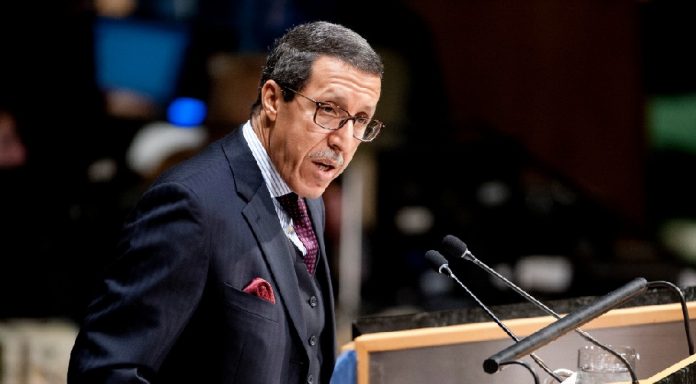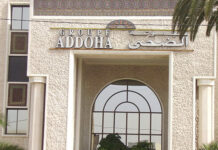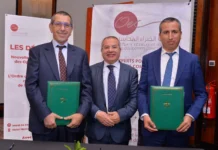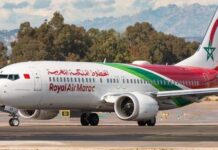Omar Hilale, Morocco’s Permanent Representative to the United Nations, issued a strong response to the UN Security Council following what he described as a “provocative, false, and misleading” statement by Algeria’s Secretary-General of the Ministry of Foreign Affairs, Lounes Magramane, regarding the Moroccan Sahara. Hilale accused the Algerian representative of once again displaying his country’s deep-seated hostility towards Morocco and its “obsessive fixation” on the Sahara issue during a recent UN Security Council meeting.
In his letter, Hilale emphasized that during the Security Council debate on Monday, presided over by Sierra Leone’s President Julius Maada Bio, the Algerian official strayed from the session’s agenda, which was focused on “Maintaining International Peace and Security: Addressing Historical Injustices and Enhancing Africa’s Effective Representation on the Security Council.” Instead of contributing to the topic at hand, Magramane chose to make unfounded remarks about the Moroccan Sahara, an issue that was not on the session’s agenda.
A statement out of context
Hilale pointed out that rather than proposing tangible measures to address Africa’s underrepresentation on the Security Council, the Algerian representative opted to present misleading claims and baseless accusations, driven by what Hilale described as Algeria’s “morocco-phobia” and “obsession” with the Sahara. He criticized Algeria for prioritizing its anti-Moroccan agenda over the legitimate interests of Africa, despite its mandate to defend African interests at the UN.
Hilale noted that the Algerian official’s remarks were particularly disrespectful to the President of Sierra Leone, who had intended to highlight Africa’s representation at the Security Council as a key focus of his country’s presidency. Instead, Algeria was the only nation to bring up the Moroccan Sahara during the session, deviating from the intended topic of discussion.
The Moroccan Sahara: A historical and territorial reality
Addressing the Algerian official’s references to decolonization, Hilale reiterated that the issue of the Moroccan Sahara is one of territorial integrity and national unity for Morocco, not a matter of decolonization. He underscored that international law, historical records, UN Secretary-General reports, the International Court of Justice’s advisory opinion, and UN Security Council resolutions do not classify the Moroccan Sahara as a “colonized territory.”
Hilale reminded the Security Council that the decolonization of the Moroccan Sahara was conclusively resolved by Morocco’s Green March, whose 50th anniversary will be celebrated next year. The region’s reintegration into Morocco was formalized by the Madrid Agreement on November 14, 1975, which was officially recorded with the UN on November 18, 1975.
Hilale also highlighted that the Moroccan Sahara is currently part of a political process under the auspices of the UN Secretary-General and his personal envoy, aimed at finding a realistic, pragmatic, and mutually acceptable political solution.
Algeria’s contradictory stance on self-determination
In response to Algeria’s invocation of the principle of self-determination, Hilale criticized Algeria for applying this principle selectively and insidiously to undermine Morocco’s sovereignty over the Sahara. He pointed out that UN Resolution 1514 clearly states that the right to self-determination must not disrupt the territorial integrity of UN member states.
Hilale also challenged Algeria’s double standards by highlighting its refusal to recognize the right to self-determination for the Kabyle people within Algeria, who have been marginalized and oppressed for centuries. He called on Algeria to be consistent in its support for self-determination by granting the same right to the Kabyle people as it demands for others.
The Moroccan Sahara: A model of regional development
Hilale dismissed Algeria’s claims about the exploitation of resources in the Moroccan Sahara, noting that no UN reports or Security Council resolutions have validated these allegations. He highlighted Morocco’s investment of $8 billion in the development of its southern provinces, which has transformed the region into a hub of socio-economic development and a gateway between Africa and the rest of the world.
He invited the Algerian official to review UN reports from 2016 onwards, including those from 2021, 2022, and 2023, which recognize Morocco’s significant efforts and investments in the development of the Sahara. Hilale contrasted this with Algeria’s use of its oil and gas revenues to finance and arm separatist movements, destabilizing the region rather than investing in its own development.
Implementation of Security Council resolutions
Finally, Hilale criticized Algeria’s contradictory approach to UN Security Council resolutions on the Moroccan Sahara. He noted that while Algeria officially rejects these resolutions, it also calls for their implementation. Hilale attributed the current deadlock in the political process to Algeria’s refusal to participate in roundtable discussions, despite repeated calls from the Security Council.
In concluding his letter, Hilale expressed hope that Algeria would focus more on the interests of the African continent during its remaining time on the Security Council, rather than pursuing its anti-Moroccan agenda. The letter sent by Ambassador Hilale will be published as an official document of the United Nations.





